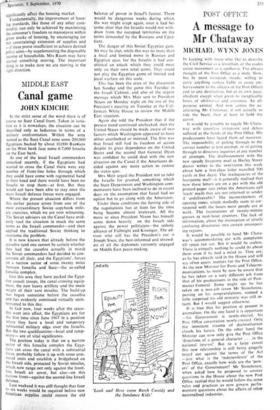MIDDLE EAST
Canal game
JOHN KIMCHE
In the strict sense of the word there is of course no Suez Canal front. Taken in isola-
tion as it is nowadays, the situation can be described only as ludicrous in terms of a military confrontation. Within the area named as the Suez Canal zone some 200,000 Egyptians backed by about 10.000 Russians on the West bank face some 6-7,000 Israelis on the East bank.
As one of the local Israeli commanders remarked recently, if the Egyptians had
wanted to cross the Canal there were any number of front-line holes through which they could have come with regimental band at their head and there would have been no Israelis to stop them—at first. But they would not have been able to stay once the main Israeli defence forces were engaged. Where the present situation differs from this earlier picture arises from one of the most extraordinary Soviet copybook milit- ary exercises, which we are now witnessing. The Soviet advisors on the Canal have evid- ently read the situation in much the same terms as the Israeli commander—and then applied the traditional Soviet thinking to overcome .the problem.
It is now known that already before the ceasefire (and one cannot be certain whether they had the ceasefire actually in mind) the Soviet commanders had decided to con- centrate all their, and the Egyptians', forces on a narrow sector of some twenty miles between Ismailia and Suez—the so-called Ismailia complex.
Into this area they have packed the Egyp- tian assault troops, the canal-crossing equip- ment, the new heavy artillery and the main Weight of their SAM missiles. The build-up was begun sometime before the ceasefire and has evidently continued virtually unin- terrupted to this day.
In fact now, four weeks after the cease- fire went into effect, the Egyptians are for the first time since June 1967 in a position Where they have a local and temporary substantial military edge over the Israelis. But the two qualifications—local and temp- orary— are of vital significance.
The position today is that on a narrow sector of this Ismailia complex the Egyp- tians can cross the canal with a substantial force, probably follow it up with some arm- oured units and establish a bridgehead on the Israeli side, protected by Soviet missiles, which now range not only against the front- line Israeli air cover, but also—on this
narrow front—against the second-line Israeli defence.
Last weekend it was still thought that four to six weeks would be required before new American supplies could restore the old balance of power in Israel's favour. These would be dangerous weeks during which the war might erupt again, once it had be. come clear that the Israelis would not with- draw from the occupied territories on the terms demanded by the Russians and Egyp- tians.
The danger of this Soviet/Egyptian gam- bit may be that, while this was no more than a local and limited move in Russian and Egyptian eyes, for the Israelis it had con- stituted an attack which they could meet only on their own total terms. They could not play the Egyptian game of limited and local warfare on this scale.
This has been the crux of the discussion last Sunday and the game this Tuesday in the Israeli Cabinet, and also of the urgent message which Mrs Meir sent to President Nixon on Monday night on the eve of the President's meeting on Tuesday at the Cali- fornian White House to review the Middle East situation.
Again she told the President that if the present trend continued unchecked, then the United States should be made aware of two factors which Washington appeared to have either overlooked or misread. The first was that Israel still had its freedom of action despite its great dependence on the United States and the second that General Dyan was confident he could deal with the new situation on the Canal if the Americans de- cided against any more action to restore the status quo.
Mrs Meir urged the President not to take the Israelis for granted, something which the State Department and Washington com- mentators have been inclined to do in recent days on the assumption that Israel had no option but to go along with the Americans.
Under these conditions the Jarring side of the negotiations has at least for the time being become almost irrelevant. All the more so since President Nixon has himself come down heavily on the Israeli side against the power politicians—the unholy alliance of Fulbright and Kissinger. The ad- visor who still has the President's ear is Joseph Sisco, the best-informed and shrewd- est of all the diplomats currently engaged on Middle East peace-making.






























 Previous page
Previous page